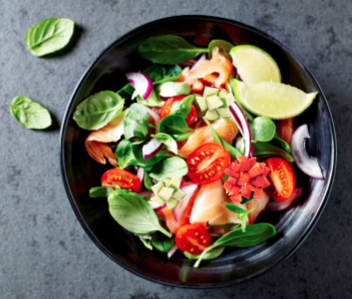
Whoo hoo! We May-ed it (hahaha – punny, right?)!
Winter’s over and May is here at last. The advent of warmer weather means change is in the offing – more outdoor living, more sunlight, and more skin showing.
Uh-oh. Given how tough winter was in most parts of the country this year – are you as fresh and glowy as you can be?
Your skin is your largest organ. Yes – not all organs are on the insides of our bodies! Just how big is it? Well, your skin weighs about 8 pounds and can stretch out to be 22 square feet.
Skin is super important because it’s what keeps our insides in and the rest of the world – toxins, foreign objects, germs and microbes that cause disease and infection – out. It acts as waterproofing, insulation, as a sensor for temperature and other sensations. And it manufactures Vitamin D needed to convert calcium for use by the bones and teeth to stay strong.
In other words – skin is your most powerful protector.
There are so many things that can go wrong with the skin: dryness, redness, blemishes, inflammation, rashes, loss of elasticity, etc. And while there is no end to the variety of lotions and potions you can use to temporarily ‘fix’ the issues and relieve the symptoms – healthy skin is a reflection of internal health and the only true way to get your glow on and reduce or eliminate skin issues is to nourish from the inside out.
How better to do this than with food?
Your skin needs a variety of nutrients to stay supple, healthy and doing its job of protecting you: water, essential fats, vitamins, and amino acids.
I am going to touch on only five key tips I highly recommend if your goal is healthier-looking skin. As a bonus, I have included a short list of some foods to consider avoiding if you are working on improving or enhancing your skin. As always – I recommend you see a nutrition professional to help guide you with your dietary changes.
Skin nourishment #1 – Water
Your skin is made up of about 64% water. So there is no doubt hydration is key for healthy-looking skin along with so many other health benefits.
I cannot tell you how many clients say to me “but I never feel thirsty!” when asked why they don’t drink more water. Pro tip: you must not wait until you feel thirsty because by then, you may be verging on dehydration which is really robbing the skin cells of their suppleness and internal moisture. Sipping throughout the day does more than gulping a cup or two all at once to ‘catch up’ too.
Water and other hydrating fluids are needed to help your skin cells stay moist and supple. Without adequate water intake, skin appears duller, and wrinkles and pores are more prominent. Who needs that, right?
For a bit of an extra anti-inflammatory hydrating lift, try boosting your water with anti-inflammatory green tea (sugar-free of course).
Skin nourishment #2 – Fish
Fish, especially oily, cold-water varieties like wild-caught salmon, rainbow trout, mackerel, or sardines, contain many nutrients important for skin health – omega-3s, and vitamins A and D to name a few.
Omega-3s are potent anti-inflammatory to help cool the flames of inflammation – throughout the body and specifically in those zits that pop out looking red and painful. Vitamin A can help with blemishes by regulating oil production and balancing hormones like androgens, which can be a major cause of acne. And in addition to building stronger bones, Vitamin D helps with skin tone and optimizes the skin’s natural immunity.
Skin nourishment #3 – Bell peppers, citrus, and broccoli
Collagen is one of the most abundant proteins in our body. It’s known to help our skin stay firm and supple by increasing the elasticity. It also helps to replace the dead skin cells with new ones, giving us a fresher, glowier and more effective barrier.
Vitamin C is necessary for your body to make collagen. So foods rich in vitamin C are very important for skin health. We all know that citrus fruits are abundant in Vitamin C but did you know that red bell peppers actually have more Vitamin C in them per serving than do those sunshine fruits? Broccoli too is a great source of Vitamin C but be cautious of how you cook it. Overcooking vitamin C-rich foods can destroy some of the skin-supporting vitamins. Try having these veggies lightly steamed or raw for maximum vitamin C levels.
Skin nourishment #4 – Pumpkin seeds
Continuing on the subject of collagen – zinc is a trace mineral that really helps maintain collagen while also promoting skin renewal. It protects your skin membranes which helps with immunity and of course, improved healing of wounds and other infections or sores like cystic acne which can leave deep scars.
Beyond that, zinc is a powerful antioxidant which can lessen the free-radical damage that can occur when you are exposed to harmful UV rays, pollutants or other skin-agers.
Pumpkin seeds are a zinc superfood as they contain very high levels. Enjoy them as a snack, add them to salads, oatmeal or yogurt or blend them up with garlic, herbs and olive oil for a simple and amazing pesto.
Skin nourishment #5 – Sleep more & stress less
Okay I know these aren’t exactly foods, but they’re an important way to stay nourished from the inside out and contribute to naturally great skin.
When we don’t sleep enough, or stress too much, our body flips on ‘fight, flight or freeze’ systems that affect our whole body… including our skin.
Stress hormones, especially cortisol, can increase inflammation and magnify skin disorders such as eczema, psoriasis, and rosacea. It can also be a catalyst for acne as cortisol stimulates the body’s sebaceous glands to secrete more oil, clogging pores and leading to more break outs.
Prioritize sleep and stress management, and you can see results in your life, and in your skin. Three simple things to start the ball rolling: 1. turn off the electronic devices 30 minutes before bedtime and give your hormones a chance to settle in for sleep; 2. If you have trouble sleeping or getting back to sleep if you wake in the night, try this simple deep breathing, called the 4-7-8 technique; and 3. get outdoors and enjoy nature. The Japanese art of shin-rin yoku or ‘forest bathing’ shows definitive scientific proof that you can significantly reduce your stress levels and improve your cardiovascular health biomarkers simply by being out in nature for 30 minutes. A park, a forest, a waterfront, a trail – wherever you can, let nature help you improve your skin.
Watch out for these foods
Some foods are allergenic or inflammatory. These can cause all sorts of issues in your body, including affecting your skin.
It’s hard to come up with one list of inflammatory or allergenic foods for everyone as each person is biochemically unique, so you may have to go through this and see what applies to you. But there are a few common allergens to focus on and limit or eliminate from your diet as a step to more healthy beautiful skin.
Let’s start with processed foods. Between the additives, preservatives, chemicals, added sugars or the way nutrients are morphed into something unhealthy during the factory processing, these food are serious culprits when it comes to inflammation and other negative health effects. Try ditching pre-packaged and fast foods in favour of whole foods as much as possible. And not just for the benefits to your skin, although you’ll soon see a fresh and glowy change, but for your digestion, fuzzy brain, blood sugar levels and more.
The second potential allergen to eliminate is gluten. While only a small number of people have actual allergies to gluten (i.e., those with celiac disease), many more people are intolerant to it or find their sensitivities heightened because of how much they consume on a constant daily basis. Gluten is a protein found in wheat, barley, rye and a few other grains. Many people have had several health concerns, including skin issues like keratosis pilaris (that ‘chicken skin’ condition that often appears on the back of your arms, on your cheeks or on your thighs) clear up after eliminating gluten from their diets.
Third in line is dairy. It could be a hormonal response as cows who produce milk are perpetually impregnated and therefore have a high level of bovine growth hormone (BGH) that passes through to the milk and then impacts human hormones. Or even an insulin response. Because of its unique protein make-up, dairy can elicit a significant insulin response which then stimulates inflammation. We don’t quite know why, more studies are needed, but many people who cut out dairy report better skin.
Conclusion
Skin health is not just about what you put on your skin, but what your skin gets from the inside too. There are lots of important nutrients and foods to help support healthy skin. Which also means, that there are lots of foods that can affect your skin in negative ways as well.
Hydrating, eating nutrient dense whole foods, and avoiding common allergenic and inflammatory foods might make all the difference for you.
As you start showing more skin during the warmer months of the year, wouldn’t you like the skin you are in to be its healthiest, glowiest and most beautiful?
Here’s a yummy recipe that combines several skintastic nutrients and can come together super quick for warm-weather lunch or dinner.
Recipe (Omega-3 and Vitamin C rich): Not Your Typical Salmon Salad
 Serves 2
Serves 2
Ingredients:
- 4 cups baby spinach (or mixed greens)
- 1 bell pepper, chopped
- 1 cup cherry tomatoes
- ½ large cucumber, chopped
- 8 oz smoked salmon, or 1 can salmon, roughly chopped
- Red onion, sliced (Optional)
- Lime wedges (Optional)
- Drizzle of your favourite (gluten-free, dairy-free) dressing
Directions:
- Place 2 cups of greens into each of 2 bowls.
- Top with veggies and salmon.
- Drizzle with dressing. Garnish with lime wedges, if desired.
- Serve & enjoy!
Tip: Serve with a large mug of green tea for an extra skin-supporting bonus.
Healthfully yours –
Trish
References:
https://www.thepaleomom.com/overcoming-medical-dogma-eczema/
https://www.precisionnutrition.com/all-about-acne-nutrition
https://www.healthline.com/health/4-best-vitamins-for-skin#VitaminD2
https://chriskresser.com/nutrition-for-healthy-skin-part-1/
